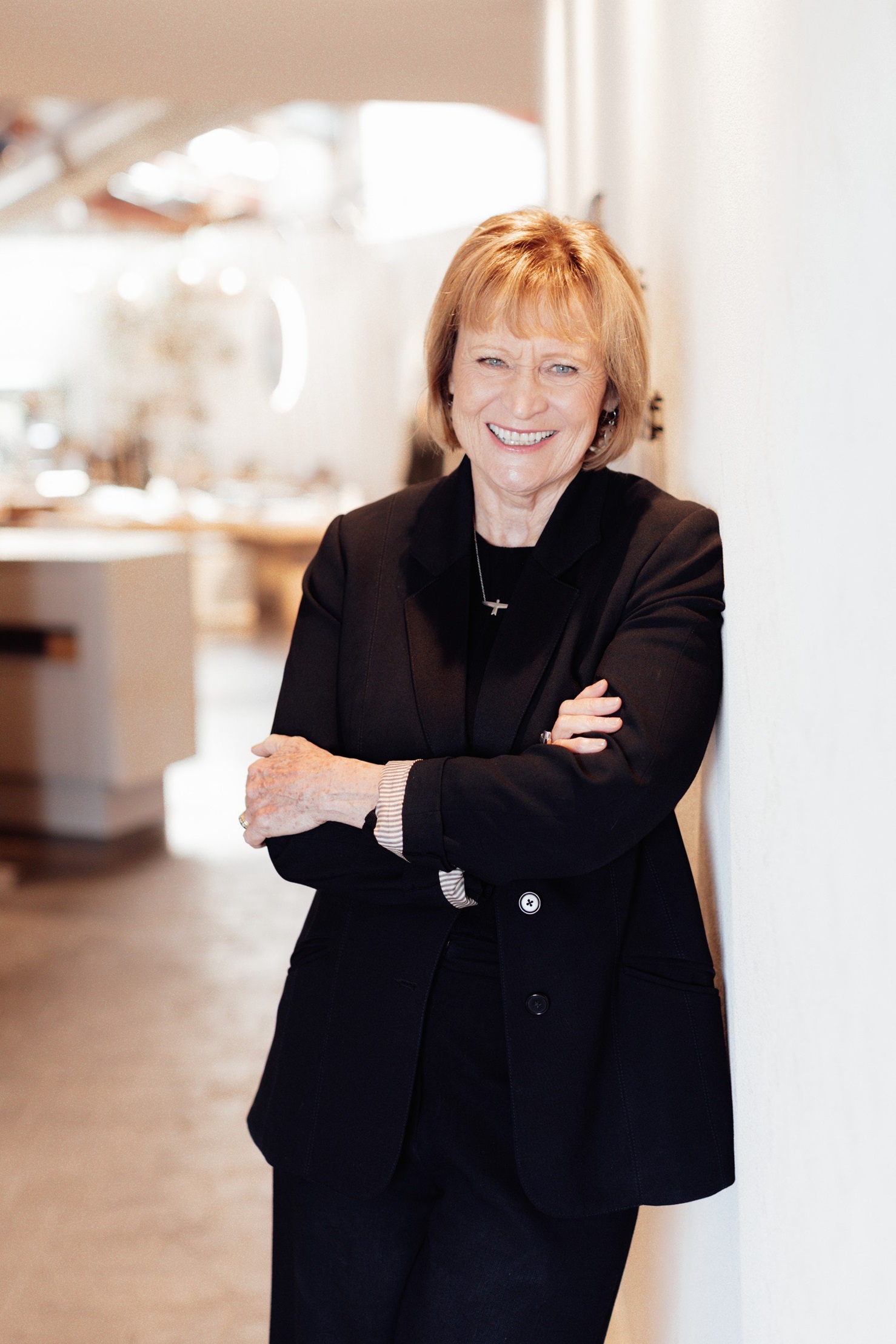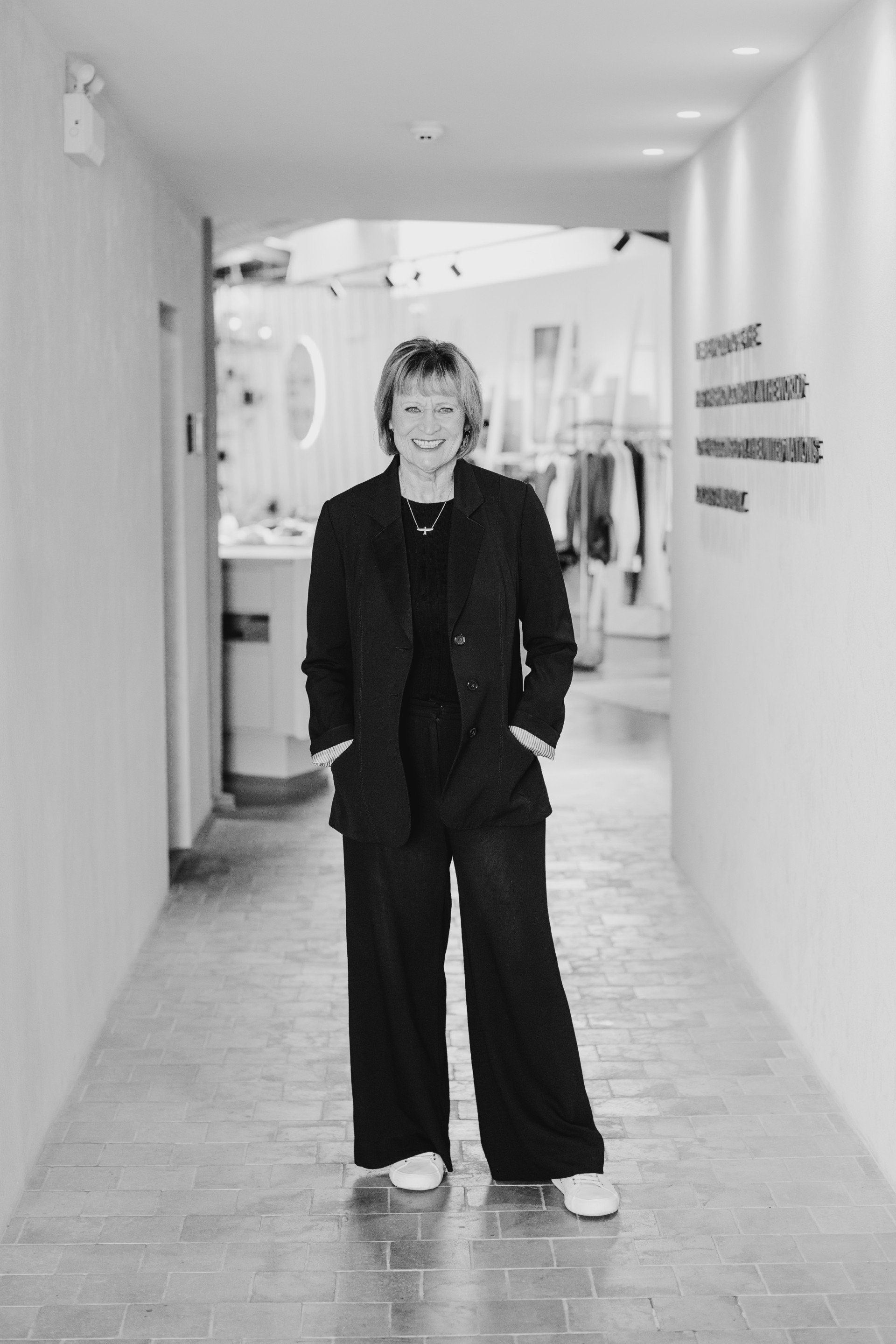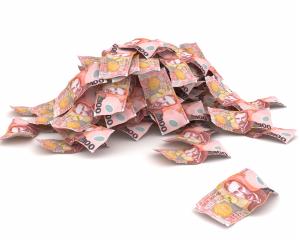
Smartly dressed in a two-tone merino outfit, Peri Drysdale reaches for a mineral water and takes a small sip.
Her throat is hoarse from a four-hour talk earlier in the morning, recounting the passage of Untouched World, an ecologically sustainable clothing company launched nearly 30 years ago.
Back at home base, the founder and chief executive relaxes in her award-winning cafe facing an outdoor courtyard. Above a mantelpiece is a large sculptural Māori kite, representing the close relationship between people and nature, values true to her heart.
The cafe’s decor is in natural materials, and part of the Christchurch headquarters.
Next to it is a large retail area displaying collections made from fine merino wool and other natural fibres. Not far away, office staff are close to calling it a day, while the knitting factory will go through the night.
Her voice somewhat soothed, she goes over a story retold many times over.
Untouched World Ltd was launched in 2016, but its beginnings can be traced to 1981.
Raised on a sheep farm near Rakaia Gorge, she headed off to train as a nurse in Christchurch, specialising in echocardiography to diagnose heart disease.
"I ended up setting up the echo laboratory at Princess Margaret Hospital and I absolutely loved that. In those days it was a single pulsed beam of ultrasound and you had to fire it at the heart and the bit that came back got captured on polaroid film. That was so rewarding because we were sending patients off for open heart surgery for things which weren’t being diagnosed before, until this machine arrived."
Due to give birth to their first child, Tim, she reluctantly handed in her notice because there was no part-time work or maternity leave back then.
"Emily, our second child, arrived fairly soon after. I was super busy initially. After a while I started to think, well, there’s just a little bit of the brain that needs entertaining and what could I do? Funny enough, I was sitting in a tent at Okain’s Bay on Waitangi weekend with the family and I just had this idea that maybe I could add value to some of our primary product — wool — and make some beautiful items and wrap around them the New Zealand country values as I saw them then, and sell them."
Even today she wonders how this epiphany came to her, let alone how she made it happen.
With $200 in her pocket, someone was found to spin the yarn and a neighbour helped write up knitting patterns.
After she put an advertisement in the newspaper, 10 outworkers were put to work to knit a hooded woollen anorak from halfbred wool for 1 to 3-year-olds, and then mittens and little boots.
Within four years 500 workers were producing luxury clothes such as jumpers, hats, scarves and gloves.
The home-based garment manufacturing business was then called Snowy Peak Ltd, in recognition of the backcountry crest on the family farm.
Despite trade advice to the contrary, she was determined to export and the United States was the first market, the clothing taken on by a retailer in Lincoln, Nebraska.
Knowing little about the difference between a debtor or creditor — let alone an invoice and a statement — it was a steep, "almost vertical" learning curve.
As a child she would listen to the chat over dinner among those at the table — family and farm workers and visitors — huddled next to the coal-fired burner for warmth in the kitchen. The conversation often led to New Zealand’s reliance on primary industries. Her farming father would worry about what would happen if the United Kingdom stopped taking farmers’ products.
That made an impression on her, as did another snapshot of her childhood.
When she was 6 years old, her mother took a small box wrapped in brown paper from a padlocked mail bag and inside was a pair of shiny red shoes for her to wear at a wedding.
"I can still remember her taking one of the shoes out and turning it over. There were three little letters on the leather sole — Made in England — and she said that means it’s good quality. So that planted the seed for taking New Zealand’s values and wrapping it around New Zealand products and sell them offshore."
A setback arrived when they bought the first computerised industrial machine of its type from Japan in 1985 and the warning bells sounded when they spotted an ominous No1 etched on its chassis.
Dealing with a knitting machine still in development took its toll, and they were close to packing it in. Adding to the pressure was the loan taken out was three times the value of their house and came with a 27% interest rate.
Their accountant encouraged them to press on and tech-minded husband Alex was a key to navigating through this tough time, she said.
Today, about 20 knitting machines work around the clock and the original Snowy Peak brand has evolved into the major brands of Untouched World and Merinomink, a fashion range made from possum fibre blended with merino.

More than 140 staff are based at Christchurch HQ or outlying sites to make, sell and distribute a clothing range in knitwear and woven fabric sold online to more than 50 countries and retailed by stockists in seven countries.
Environmentally-conscious collections come in fine wool, mohair and cashmere and summer fabrics in cotton, linen and tencel, with the emphasis on quality, comfort and longevity.
Untouched World has its own retail concept stores in Christchurch, Wanaka, Wellington and a newly opened one in Auckland, as well as outlet stores.
The once cottage industry has grown into a fashion business winning international awards.
Former US presidents Bill Clinton and Barack Obama are among high-profile customers.
Mrs Drysdale wanted to show the world it was possible to deliver stylish, quality pieces without polluting the planet and to use fashion as a vehicle for change.
She said the company was leading the then non-existent business-for-good movement, going beyond just profit to care about people and the planet and to create a better world for future generations.
"I had picked up that the whole environmental thing was an opportunity. As I was travelling around the world, I got so concerned about what was happening environmentally and used to worry about how we could make a difference. I knew this tiny little company in a little country at the bottom of the world couldn’t do that by itself , but then I thought we couldn’t keep going without doing something."
The Untouched World Foundation, a charitable trust, followed in 2020 and is dear to her heart.
She said young adults attending its week-long programmes were going on to champion the way for a more sustainable future through their career paths.
It is giving them the passion and the belief they need to do something to help make that difference.
The foundation was recognised by the United Nations as one of the three leading programmes in its space.
More than 3000 graduating students have progressed into law, medicine, environmental professions and varied roles. One of them is working for PayPal co-founder and venture capitalist Peter Thiel in the US.
A new direction begun this year in Dunedin is Fashion Reimagined, designed to challenge and expand thinking about critical issues facing the fashion industry.
Mrs Drysdale said the wider fashion industry was part of the problem of the planet’s degraded environment and this needed to be reversed.
An in-house target to bypass synthetic material in its clothing was 99% achieved and innovations were being worked on to get it across the line to 100%, she said.
Untouched World won its category in the top 10 global sustainable fashion brands in the world, ahead of finalists including the parent company of Gucci and English fashion designer Stella McCartney, who won last time.
The award winning extends to the cafe. For three years in a row it came out tops as the best cafe in Christchurch.
Mrs Drysdale’s genuine care for people goes beyond her home city.
She stepped in after hearing about the heart-breaking story of a family living in the slums alongside a Kolkata river in India.
The father had borrowed money for the dowry of his eldest daughter’s marriage then lost his job.
Unable to repay his debt, he was threatened with being thrown in prison.
"So he was between the devil and the deep blue sea because he either had to send the second daughter out to the sex trade or let his family be beaten every day and it was awful. When [Addington Coffee Co-op co-founder Ant Watt] contacted me and asked if we could help them get a micro industry going for them, I said yes. They now make all of our certified organic cotton
tops there from a work room and those women who do that have an income that keeps them out of that trade and their children get educated."
Reflecting on her decades-long involvement in fashion, she is "first and foremost" proud of their people, the brand and its reach in the marketplace.
Celebrating the 30th anniversary of Untouched World is a work in progress, but will include a small collection of early garments to be launched later in the year.
"One of the Achilles’ heels of this business is our garments don’t wear out and you would be surprised how many people beat a path to one of our stores to tell us they still wear the sweater or garment they bought 15 years ago."












